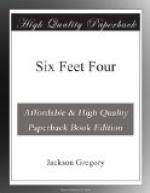Having finished with Pollard and his friends he spoke of the Bedloe boys. And United States Deputy Marshal Comstock listened throughout with the same mild interest, merely asking questions, offering no opinions.
“One last question,” he said finally. “If you had a guess who’d you say was the bad man this county wants?”
“If any stock’s missing from my range,” was the blunt answer, “I’d look up the Bedloe outfit.”
Comstock, offering no opinion, smiled and sank into a thoughtful silence.
At half past nine o’clock Thornton got to his feet and took up his hat.
“I’d better be riding,” he said, putting out his hand. “Make yourself at home.”
But Comstock came to the door with him.
“If you don’t mind I’ll ride along,” he offered carelessly. “I think my trail runs into Dead Man’s, too. And by the way, Thornton,” he added a little sharply, “my name’s just plain Richard Hampton for the present. And my business right now is ... my business!”
Thornton nodded that he understood and together they left the cabin.
CHAPTER XXV
IN THE DARK
It was a pitch black night, the stars hidden by dense drifting clouds, and intensely still. Buck Thornton and Two-Hand Billy Comstock, riding side by side with few words, turned straight out across the fields, the marshal reining his horse close in to that other horse he could scarcely see and leaving to the cowboy the task of finding their way.
They rode slowly until they turned into the level county road and then swifter that they might come into Hill’s Corners before it was midnight. When at last the twinkling lights of Dead Man’s Alley winked at them Comstock struck a match and looked at his watch.
“Fifteen minutes of twelve,” he said. “You’re on time. And I guess you can do the rest of your riding alone? So long. I’m apt to drop in on you at the ranch any day.”
Comstock had planned to ride straight to the Brown Bear saloon, to invest in a stack of chips, and to spend the evening “seeing the town.” And Thornton, understanding that if the note from Winifred Waverly were truthful in all that it said and in all that it suggested, it would be as well if he were not seen tonight, turned out along the outskirts of the village to come to Pollard’s house without riding through the main street.
“Easy, Comet, easy,” he muttered to his horse, having no desire to come to the appointed place before the appointed hour. “We’ve got fifteen minutes and then won’t have to keep the lady waiting. If she’s there, Comet!”
For even yet his suspicions were not all at rest, already he rode with reins and quirt in the grip of his left hand, the right caught in the loose band of his chaps. It lacked but a few minutes of midnight when he entered the dark, silent street in which was Henry Pollard’s house.




